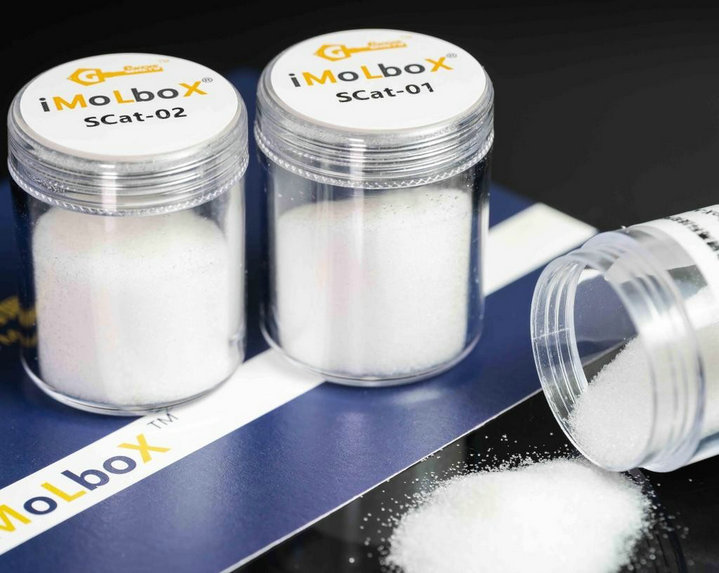Nucleating agent is a chemical additive suitable for incomplete crystalline plastics such as polyethylene and polypropylene. By changing the crystallization behavior of the resin, it accelerates the crystallization rate, increases the crystal density and promotes the miniaturization of the grain size, thereby shortening the molding cycle and New functional chemical additives that improve the physical and mechanical properties of products such as transparency, surface gloss, tensile strength, rigidity, heat distortion temperature, impact resistance, and creep resistance.
一、Working principle
Impurities in polymers have a great influence on their crystallization process. Some impede crystallization, while others promote crystallization. These impurities that can promote crystallization play the role of crystal nuclei in the crystallization process of polymers.
In the molten state, the nucleating agent provides the required crystal nuclei, causing the polymer to transform from the original homogeneous nucleation to the heterogeneous nucleation, thereby accelerating the crystallization speed, refining the grain structure, and conducive to improving the The rigidity of the product can shorten the molding cycle, maintain the dimensional stability of the final product, suppress light scattering, improve the transparency and surface gloss and the physical and mechanical properties of the polymer (such as stiffness, modulus), shorten the processing cycle, etc. For example, adding a nucleating agent to polypropylene can speed up the crystallization speed and form small and dense spherulite particles, allowing the molecular chain to crystallize very quickly at higher temperatures. The spherulites can grow in a relatively regular manner, with many numbers and sizes. Very small. As an important member of the nucleating agent, the transparent agent's main function is to improve the optical effect of the polymer.
二、Application
Nucleating agents have been widely used in various aspects such as transparent polypropylene modification, non-transparent polypropylene modification, polyethylene modification, nylon modification and injection molding, PET modification and injection molding, and polyformaldehyde modification.
三、Classify
There are various nucleating agents with different properties and functions. Nucleating agents can be divided into alpha and beta nucleating agents according to the type of crystal form they induce to form PP, and according to the main chemical components of the nucleating agent, they can be divided into organic, inorganic small molecule and polymer nucleating agents. Alpha nucleating agents include organic and inorganic small molecules and organic polymers. Similarly, beta nucleating agents are also divided into inorganic small molecules, organic small molecules, and polymer nucleating agents.
Inorganic alpha nucleating agents are usually some metal oxides, inorganic particles, etc., such as calcium carbonate, calcium oxide, talc, silicon dioxide, boron nitride, kaolin, carbon black, etc. Its advantage lies in its wide source of raw materials, simple application and low cost of use. Its disadvantage is that it has poor compatibility with PP and poor dispersion, resulting in poor product performance. Therefore, some high-performance materials are difficult to apply; organic small molecules α nucleation Agents are mainly sorbitol and its derivatives, carboxylic acids and their metal salts, rosins, phosphate nucleating agents, etc.; polymer alpha nucleating agents are polymers with a similar structure to PP, such as poly Vinylcyclohexane PVCH, polyethylene pentane, polyethylene several cyclosilane, etc.
1、Organic small molecule nucleating agent
Organic small molecule nucleating agents overcome the problems of poor transparency and glossiness of inorganic nucleatin g agents and can significantly improve the processing performance of the product. They are generally low molecular weight organic compounds, mainly including aliphatic carboxylic acid metal compounds, sorbitol benzylidene derivatives, aromatic carboxylic acid metal compounds, organic phosphates and wood acid and their derivatives, sodium benzoate and bis(p- Tert-butylbenzoic acid) aluminum carboxylate, etc. Although this type of traditional nucleating agent can improve the performance of PP, the effect is not ideal. Because of its low price, it is still used in some occasions. Aromatic and aliphatic nucleating agents and their salts are cheap and can improve the stiffness and heat distortion temperature of polyolefin products. However, due to their poor compatibility with polymer resins, many properties of polyolefin products cannot be obtained. It is generally limited to injection molded products and calendered products.
g agents and can significantly improve the processing performance of the product. They are generally low molecular weight organic compounds, mainly including aliphatic carboxylic acid metal compounds, sorbitol benzylidene derivatives, aromatic carboxylic acid metal compounds, organic phosphates and wood acid and their derivatives, sodium benzoate and bis(p- Tert-butylbenzoic acid) aluminum carboxylate, etc. Although this type of traditional nucleating agent can improve the performance of PP, the effect is not ideal. Because of its low price, it is still used in some occasions. Aromatic and aliphatic nucleating agents and their salts are cheap and can improve the stiffness and heat distortion temperature of polyolefin products. However, due to their poor compatibility with polymer resins, many properties of polyolefin products cannot be obtained. It is generally limited to injection molded products and calendered products.
Compared with other organic nucleating agents, the transparency, rigidity, surface hardness and thermal deformation temperature of products modified by organophosphate compounds are greatly improved, and they have good thermal stability and do not affect polymerization under high temperature conditions. Other properties of the product, but poor dispersion is the main drawback of this type of nucleating agent. Although this type of nucleating agent is more expensive, it has unparalleled performance and is still widely used in packaging materials that come into contact with food. Sorbitol nucleating agents can significantly improve the transparency, surface gloss, rigidity and other thermodynamic properties of products, and have good compatibility with PP. They are a type of transparent product that is currently undergoing in-depth research. Nucleating agent. With its good performance and low price, it has become a type of PP nucleating agent with the most active development, the largest variety, and the largest production and sales volume at home and abroad.
2、Inorganic nucleating agent
Mainly include talc, calcium carbonate, silica, alum, titanium dioxide, calcium oxide, magnesium oxide, carbon black, mica, etc. These were the first cheap and practical nucleating agents developed, but their application in high-performance materials was limited by poor transparency and surface gloss. The rare earth metal (such as lanthanum) compounds developed later have unique functions and have their own special functions as PP crystal modifiers. At the same time, it can also be made into luminous plastics, etc.
3、Polymer nucleating agent
Due to the shortcomings of organic and inorganic nucleating agents, polymer nucleating agents have gradually become a research hotspot. However, in the 1980s, due to the poor blendability of high melting point polymers and polyolefin resins, single polymer nucleating agents There are few commercially available olefin nucleating agents. It was not until the 1990s that polyolefin resins containing high melting point polymer nucleating agents appeared, such as polybutylene terephthalate, poly3-methylbutene-1, polyvinylcyclosilane, etc.
4、β crystal nucleating agent
Modifying PP with β-crystal nucleating agent is a simple and effective method to improve the performance of PP. There are five crystal forms of PP: α, β, γ, δ and pseudo-hexagonal state. Amon g them, α and β are more common. Commercial PP mainly contains the most stable α crystal form, and the β crystal form can only be easily generated under specific conditions. Since the latter can only be generated under specific conditions, adding a nucleating agent to induce β crystallization of PP is the only way to produce commercial β crystal PP. Adding different nucleating agents can achieve different final product requirements. For example, the addition of alpha nucleating agent can refine the crystal size, increase the degree of solidification, improve transparency and shorten the molding cycle, such as enhancing the stretchability and Stiffness; The knotted form can enhance the notched impact strength and heat deformation temperature of PP. The addition of nucleating agents can significantly improve the toughness of the material. Adding crystal modifiers to PP, PE, polyamide, polyester, polyether and other solid polymers can change the crystallization behavior of the resin, speed up the crystallization speed, increase the final density and promote the refinement of the grain size. , shorten the molding cycle, fully or partially improve the physical and mechanical properties of the product such as transparency, surface gloss, tensile strength, rigidity, heat distortion temperature, etc.
g them, α and β are more common. Commercial PP mainly contains the most stable α crystal form, and the β crystal form can only be easily generated under specific conditions. Since the latter can only be generated under specific conditions, adding a nucleating agent to induce β crystallization of PP is the only way to produce commercial β crystal PP. Adding different nucleating agents can achieve different final product requirements. For example, the addition of alpha nucleating agent can refine the crystal size, increase the degree of solidification, improve transparency and shorten the molding cycle, such as enhancing the stretchability and Stiffness; The knotted form can enhance the notched impact strength and heat deformation temperature of PP. The addition of nucleating agents can significantly improve the toughness of the material. Adding crystal modifiers to PP, PE, polyamide, polyester, polyether and other solid polymers can change the crystallization behavior of the resin, speed up the crystallization speed, increase the final density and promote the refinement of the grain size. , shorten the molding cycle, fully or partially improve the physical and mechanical properties of the product such as transparency, surface gloss, tensile strength, rigidity, heat distortion temperature, etc.
四、Selection of nucleating agent
1、Adaptability to processing technology
Stable under molding processing conditions, no decomposition reaction occurs;
2、The organic reactive heterogeneous nucleating agent has an appropriate melting point
It can be completely melted at the processing temperature. If part of the nucleating agent cannot be melted, "fish eyes" will be produced in the molded products, affecting the transparency of the products;
3、Compatibility with resin
Only when there is good compatibility between additives and resin can the additives exist in the product stably, evenly and for a long time, and play a good role. If the compatibility is not good, the product will "sweat" or "bloom". "Phenomenon.
4、Dispersion in resin
The nucleating agent should have good dispersion in the resin and should be easy to disperse evenly. The fineness of the nucleating agent particles should be high. The finer the particles, the easier they are to disperse. Solid nucleating agents should be ground on a three-roller or ball mill before being added to the resin.
5、Durability
There are three main aspects of nucleating agent loss during processing and use: volatilization, extraction and migration. The durability of the nucleating agent is mainly related to the molecular weight of the additive and its solubility in the medium and resin.



